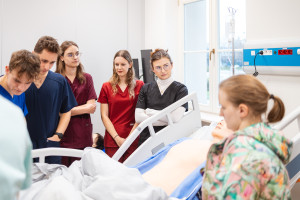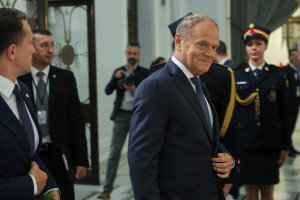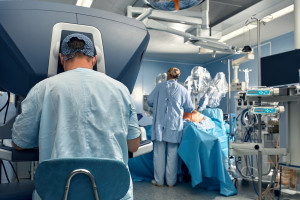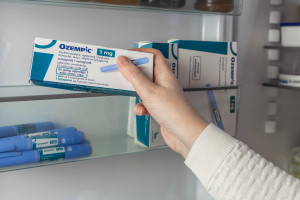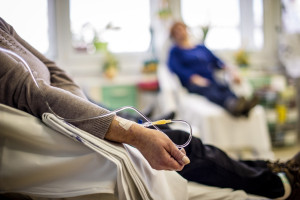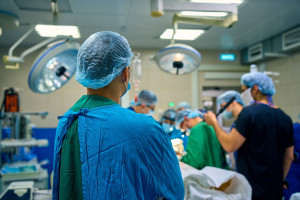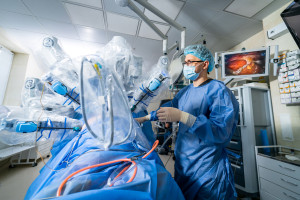Prof. Banasiewicz on Polish surgery: we remain in a system from a different era

- We have too many general surgery departments. With current staffing levels, many of them operate at minimal staffing levels, which is not good for patients, says Prof. Tomasz Banasiewicz of the Main Board of the TChP.
- There is no agency at the Ministry of Health that would look at local or regional ideas to improve the organization of surgery and develop the best, proven ones - he says.
- We have reached an agreement with the Ministry, he says, about realigning the pricing of general surgery procedures. This is one of the topics of discussion announced during the 72nd Congress of the Association of Polish Surgeons.
- As Professor Banasiewicz points out, the Congress program will also include issues such as prehabilitation, nutritional treatment of the patient, and antibiotic therapy in postoperative wound infections.
- - The results of our work also depend significantly on the strategy of general medical treatment - he explains and explains, for example, the importance of modern antibiotic therapy in the treatment of surgical patients.
We talk with Prof. Tomasz Banasiewicz, Head of the Department and Clinic of General, Endocrine and Gastroenterological Oncology Surgery at the K. Marcinkowski University of Medical Sciences in Poznań, about the systemic challenges facing Polish surgery.
Piotr Wróbel, Rynek Zdrowia: We're speaking less than three months before the 72nd Congress of the Association of Polish Surgeons. What challenges are facing Polish surgery?
Prof. Tomasz Banasiewicz, MD, PhD: There are many, but primarily organizational ones, because in this respect we remain at a stage from a different era. Yes, we emphasize the equipment of surgical departments, but that's only one aspect of modernity.
The systemic structure of surgical departments in the country, especially at the district level, cannot be called modern. I should emphasize right away that I worked in district hospitals and greatly value the work of these units. However, I believe, and I believe I share the view of many colleagues from the Association of Polish Surgeons, that we have too many general surgery departments. Given current staffing levels, many of them operate at minimal staffing levels, which is not good for patients.
It's worth considering replacing some 24-hour surgical departments with elective or same-day surgery departments. This is an organizational challenge that, if met, will allow for more efficient spending. Addressing it would also allow for the consolidation of surgical departments into better-equipped units, optimize staff utilization, and improve patient safety. I'm referring to consolidating departments where distances between hospitals are short. Not every district hospital is required to have a surgical department.
We also lack a real reference base for our centers. This means that specialized surgical departments are obligated to accept all patients requiring surgical care who present themselves to the emergency department or hospital admissions office. This leads to a situation where surgical clinics in general hospitals, such as the one I direct, lack full control over their operations. This approach is having a negative impact on the entire country, because with everything else going on, we are unable to create the resources for specialized centers.
To illustrate, using the clinic I manage as an example, less specialized hospitals expect us to help difficult patients. However, our operating space doesn't allow us to help everyone who requests our help or admit every patient from another hospital, because at the same time, we're treating simple cases, like appendicitis, that come to us from the emergency department. This creates situations where surgeons from lower-level hospitals, with less experience and resources, are left alone to deal with difficult patients.
We therefore need to establish regional, profiled reference centers that will take on difficult surgical patients in specific areas.
Another systemic problem is related to the current model of payment for the procedure rather than for the patient's outcome. This lack of a solution leads to a situation in which some surgical centers choose well-priced procedures, collect payment, but are reluctant to address complications in the patient they have operated on.
Surgeons are bogged down in paperwork. How can we change that?Modernity in surgery is commonly associated with robotics, laparoscopy – less invasiveness...
Yes, but organization is the foundation. It's a bad thing when—and that's what happens in hospitals—surgeons pore over patient records instead of doing what they were trained and educated for.
We've done research. It's astonishing. Surgeons spend up to 30 percent of their working time on administrative tasks. This involves, among other things, completing various patient treatment reports, including those for central institutions, based on retrospective data extracted from the computer. Patient follow-up methods haven't really changed much over the years.
I often ask during discussions: what's stopping doctors from taking some of the paperwork away by asking patients to complete an online questionnaire at home before being admitted to the hospital, providing their personal data and health information? This data should then be "downloaded" into the IT system. This would save surgeons a lot of time.
Going further, I see no rational reason why a system cannot be created in which patients are assigned a QR code, which, when placed on a strip, would be a "key" to accessing data at every point in the hospital, including, for example, alerts about the high risk of carrying alarming pathogens if the patient has reported multiple recent hospitalizations. The patient will then hear a message in the hallway: "Please wait, we'll find an isolation area." This saves money (prevention of hospital-acquired infections!) and allows for the practice of modern medicine, eliminating the need for a surgeon, while simultaneously gaining time to care for another patient.
Is initiating such solutions as you mentioned a matter for hospitals or for the Ministry of Health?
Ten years ago, among a group of enthusiasts—doctors and IT specialists—we implemented the iwound telemedicine application for monitoring surgical patients at the clinic, based on our own development project. It works. Patients receive the application on their phones when they are qualified for surgery. They are in remote contact with the hospital, can ask questions, and send photos. The application is managed by medical students.
During COVID, when access to clinics was significantly limited, I emailed important institutions, proposing that we transform a proven app into a larger project that would help everyone. I proposed, while clinics were closed and access to doctors was limited, that the app be made completely ready for use. It's hard to believe, but I haven't received a single response. I feel like we lack a ministry-wide agency that would look at local and regional good ideas to improve the organization and develop the best, proven ones.
Surgical procedure pricing and specialization program. Discussion ongoing.Over a year ago, the Association of Polish Surgeons strongly protested against the reduction in pricing for certain general surgery procedures, including colorectal cancer. A working group was established at the Ministry of Health, comprising physicians and experts from the AOTMiT. Has a consensus been reached?
It was an interesting experience. To my surprise, we connected. For the first three months, we learned to communicate with each other to overcome the feeling that the other side was "the bad guys." Then we slowly began to understand the discrepancy in procedure pricing and the reasons behind it. The AOTMiT works with data provided by hospitals. It showed that for a typical patient undergoing surgery for colon cancer, a physiotherapist spends 7 minutes and costs 4 złoty. And similar findings followed.
During the upcoming 72nd Congress of the Association of Polish Surgeons in Warsaw, October 22-25, we will present a regulation from the Minister of Health that realigns the pricing, in line with what we developed in our working group. It covers the cost of the procedure at an acceptable level, based on correction factors. These restrictions apply to the number of procedures performed at the center. Centers that perform a high number of procedures, ensuring the highest quality, will receive the most.
We are well on our way to establishing a price for a separate procedure: radical early endoscopic resection of submucosal cancer lesions in the colon. The problem is that the price for colonoscopy is too low, does not cover the cost of equipment, and the surgical procedure is relatively high. Instead, we propose a cost-effective procedure that is safest for patients and least invasive.
What's next for the general surgery specialization program? So far, the changes have been minor. This topic is of great interest to residents.
Yes, we'll be discussing this at the Congress as well. I have the impression that the significant amount of work we've done at TChP to improve our specialization programs has been wasted. However, we have reason to believe that the ministry will give the green light for further changes.
We want to push hard to make the specialization program more realistic in its practical aspects, including implementing some practical training on high-fidelity simulators. There are also absurdities that need to be overcome, such as allocating available slots for the introductory surgery course so that young doctors can complete it in their first year of specialization, rather than later.
Prehablit, modern antibiotic therapy. We need to talk about this too.The Congress program included medical topics that go beyond the scope of surgery. Why were these considered so important to present at the Congress?
This stems from the obvious knowledge that the results of our work also significantly depend on the general medical treatment strategy. This includes issues related to post-rehabilitation, patient nutritional therapy, antibiotic therapy, and the treatment of post-operative wound infections.
At the Congress in October, I will have the pleasure of presenting, as a representative of the European Working Group of Specialists, a new proposal for a practical and clinical classification of surgical site complications, which aims to improve early intervention management. This proposal will be the first to be presented in Central Europe.
A report published in The Lancet indicates that by 2050, more people worldwide will die from antibiotic-resistant bacteria than from cancer. Already, in Poland, of the several dozen thousand patients with the most severe complications, half die from surgical site infections. The number of antibiotic-resistant bacteria is growing, and unfortunately, we are doing a lot of harm with hasty antibiotic therapy.
So antibiotic resistance is currently one of the serious challenges also in surgery?
Yes. The aforementioned classification is intended to aid in developing antibiotic treatment strategies for postoperative wound infections. Unfortunately, we use antibiotics inappropriately worldwide, not just as surgeons. There are situations where we use them unnecessarily, too late, in inappropriate doses, over too short a period of time, or with inappropriately selected medications. All of this contributes to the development of antibiotic resistance by subsequent bacterial strains.
Empirical use of antibiotics has previously relied largely on the surgeon's experience. Now, this empirical use will also include consideration of the hospital's infection committee, which continually analyzes the bacteria present in the hospital and in what conditions. At our hospital, we have such a guide, a manual, updated every three months.
If antibiotic treatment is ineffective after 2-3 days, especially in severe infections such as postoperative intra-abdominal infections, it is necessary to administer an antibiotic from a modern group, such as the one available in our country, ervacycline. The greatest advantage of modern antibiotics, which are stored on the hospital shelf for emergencies, is, of course, that they are molecules to which bacteria have not yet developed resistance, but they also possess specific parameters regarding selective mechanisms of action, tissue penetration, secretion, and safety profile.
However, in order to effectively use modern antibiotics and administer them on time, it is necessary to perform tests for a specific patient.
So in antibiotic therapy we can also talk about "tailoring the treatment" to the patient's needs?
In a sense, yes. And this is a "tailor-made" approach that can be more effective, but for this to happen, an extended antibiogram must be performed. If we want to use modern antibiotics for specific indications, we need to think ahead. Taking a standard culture allows us to be certain two or three days after starting antibiotic therapy whether first-line antibiotics will work. However, the key is to already know whether, and which, last-resort modern antibiotic can be used if necessary.
Therefore, in surgery, tailoring antibiotic therapy means considering the strategy for managing postoperative wound infections from the outset of therapy and ordering microbiological tests for culture, following the principle: the more precise the question, the more precise the answer. For example, if infected peritoneal fluid has been collected, it's worth considering testing for evracycline, as it can potentially be used as indicated.
Hence, the recommendation to introduce modern antibiotics into standard antibiograms. Of course, we don't prescribe them empirically; they are expensive drugs considering the hospital costs, but they are also invaluable, as we use them as a last line of defense.
You also mentioned prehabilitation, when discussing the issues that will be discussed at the Congress, regarding supporting the work of surgeons. What's new in this area?
We will demonstrate a model for supporting prehabilitation, or patient preparation for surgery, in my clinic and the orthopedic clinic. In this model, the rehabilitator, using a monitoring wristband, gains online insight into the patient's compliance with recommendations, including physical activity. We will emphasize an important aspect: prehabilitation translates into surgical results, but it is not a procedure that burdens the surgeon.
We would like to ask for confirmation. Professor, do you intend to run for president of the Society of Polish Surgeons? The election will take place during the upcoming Congress.
Yes, I've decided. My candidacy was officially announced during the last TChP board meeting.
Copyrighted material - reprint rules are specified in the regulations .
rynekzdrowia



